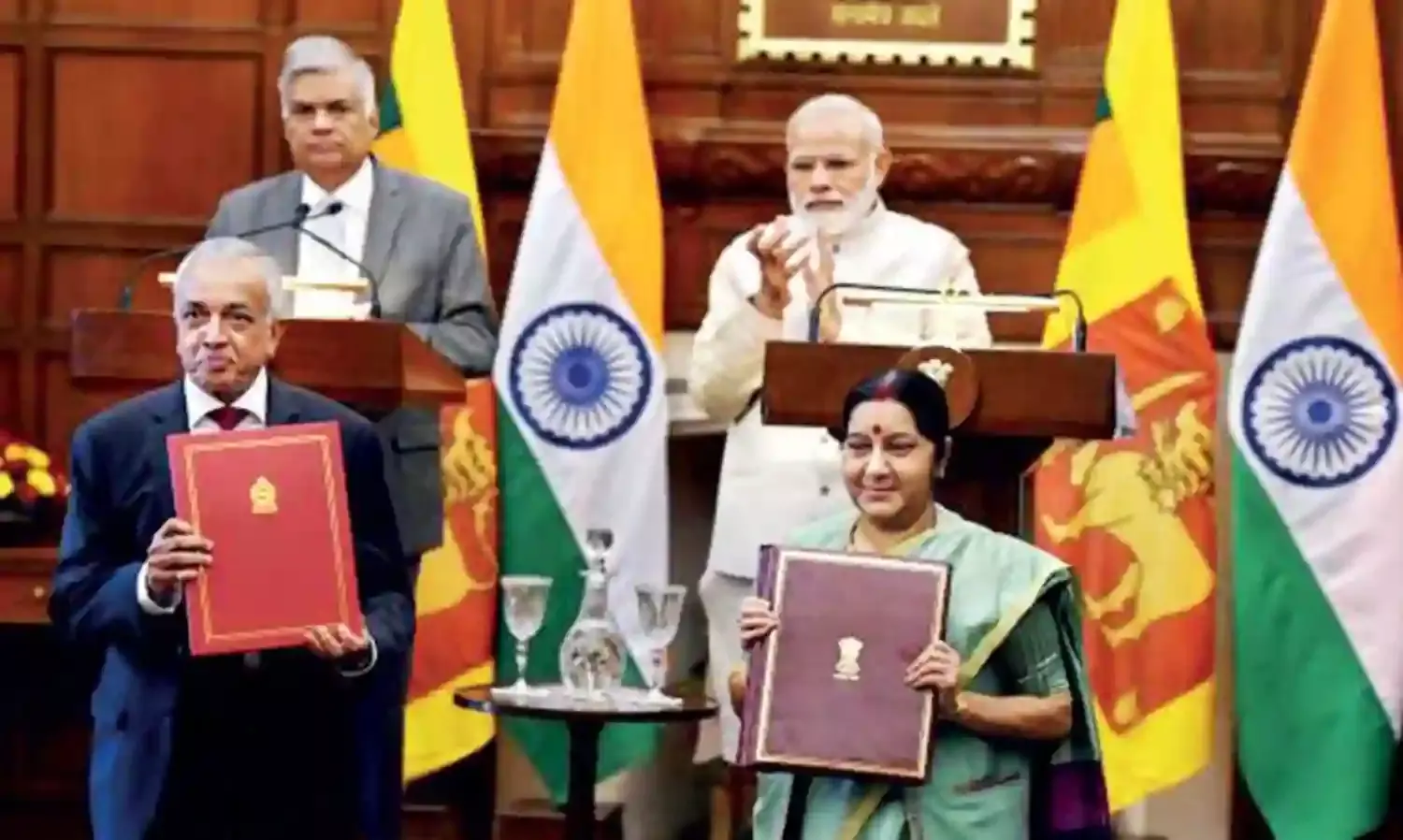India Gets Back Lankan LNG Terminal Project Given To Sino-Pakistan Firm
In April 2017, India and Sri Lanka had signed an MOU to set up the plant

According to Colombo-based ‘Sunday Times’, the Sri Lankan government has decided to cancel a tender awarded to Engro, a China-Pakistan consortium, to supply Liquefied Natural Gas (LNG) and give the contract to Petronet LNG Ltd., an Indian public sector company.
The decision was taken after India “strongly” objected to the award of the contract to the Sino-Pakistan consortium, the paper said.
The contract was originally pledged to India in 2017. On April 25, 2017, Sri Lanka and India had signed an MoU in New Delhi in the presence of Prime Ministers Ranil Wickremesinghe and Narendra Modi to execute the same project.
The MOU stipulated that by the end of May 2017, the Sri Lankan Government would issue a Letter of Intent to the Government of India or its representative, for a regasified Liquefied Natural Gas (LNG)-fired 500 megawatt capacity power plant in Kerawelapitiya near Colombo.
For the LNG Terminal/Floating Storage Regasification Unit (FSRU) in Kerawalapitiya, a Joint Venture would be formed involving entities from Sri Lanka, India and Japan, for which modalities would be worked out by July 2017 end, the MOU stated.
Further, it was stipulated that Sri Lanka would issue a Letter of Intent for the FSRU and the LNG package to India by mid-May 2017. A Joint Working Group (JWG) would be constituted for the project which would meet for the first time in the first half of May.
The MOU further said that by August end 2017, India would submit a Detailed Project Report (DPR) to Sri Lanka on the piped gas distribution system and retail outlets for the supply of Compressed Natural Gas (CNG) to the transportation sector.
The LNG project also envisaged a piped gas distribution system; and conversion of liquid fuel-based power plants to R-LNG fired plants.
However, despite expressions of concern from India from time to time about the lack of action on this and other projects listed in the MOU, there was no movement on the ground in Sri Lanka.
In August 2022, the Sri Lankan Cabinet Appointed Negotiating Committee (CANC) selected the Sino-Pakistan Engro Consortium after an international bidding process for the execution of the above project.
As expected, India protested strongly. According to Sunday Times, last Monday, the Sri Lankan Power and Energy Minister Kanchana Wijesekera submitted a Cabinet paper titled “Revisiting the National Energy Policy Related to the Development of Natural Gas Infrastructure in the Country.”
The Cabinet paper envisaged the suspension of the development of a Floating Storage and Regasification Unit (FSRU) off Kerawalapitiya on a Build, Own, and Operate basis and a compatible mooring system on Build, Own, Operate and Transfer basis.
It also covered the associated projects: the development of Offshore and Onshore Re-gasification Liquefied Natural Gas (RLNG) Transmission Pipeline Network with an Onshore Receiving Facility (ORF) and an associated system from the Floating Storage and Regasification Unit (FSRU) to the existing and future Kerawalapitiya and Kelanitissa Power Plants on Build, Own, Operate and Transfer (BOOT) basis.
The Ministry wanted to award the tender to Petronet LNG Ltd. of India, as an unsolicited procurement.
Petronet LNG Ltd is India's largest liquefied natural gas importer. It is setting up a floating LNG receipt facility (Floating Storage Regasification Unit or FSRU) at Gopalpur port in Odisha at the cost of INR 2,306 crore (US$ 280 million). The facility will have a capacity of about 4 million tonnes per annum. Therefore, it is not correct to say that it has no experience of setting up an FSRU.
Commenting on the cancellation of the Engro contract and its giving to Petronet, ‘Sunday Times’ quoted an unnamed official as saying: “This will badly hamper the investor confidence and no genuine investor will come forward in future to this country.”
The Ceylon Electricity Board’s Least Cost Long Term Generation and Expansion Plan (LCLTGEP) (2018-2037), which was approved by the Public Utilities Commission of Sri Lanka (PUCSL) in 2018, identifies the need for converting furnace oil and diesel power plants to LNG power plants to reduce power generation costs.
It was against this backdrop, that on August 44, 2022, the CANC granted approval to award the tender to the China-Pakistan Consortium, one of the two companies which had submitted proper bids for the tender, the ‘Sunday Times’ stated.



